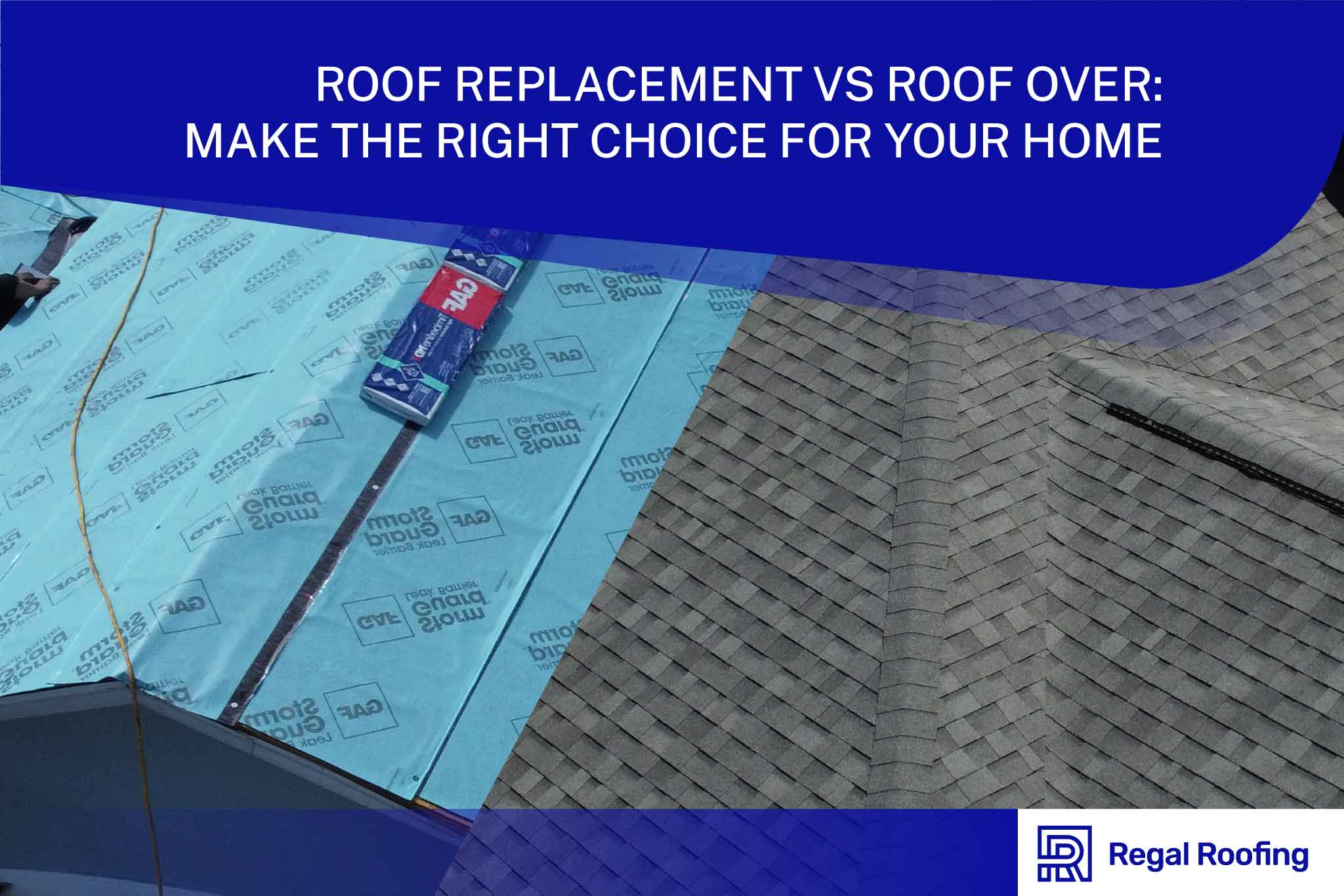When it comes to maintaining your home, there are few decisions as important as choosing between a roof replacement and a roof over. There are advantages to each option, as both are tailored to different needs and circumstances. Fully understanding both options will help you in making an informed decision based on your specific situation, whether you are dealing with leaks, selling your home, or merely trying to enhance the appearance and efficiency of your roof. This decision is especially significant when living in Florida’s harsh and unique climate.
What is a Roof Replacement?
A roof replacement involves the complete removal of your old roof in order to install an entirely new one. This can be a lengthy process, including stripping away all previous shingles, underlayment, and decking. However, a residential roof replacement can be beneficial because it provides an opportunity to inspect and repair any hidden damages or structural issues. Roof replacement is typically recommended when a roof is extensively damaged, near the end of its lifespan, or experiencing significant structural problems. A roof replacement contractor can provide this kind of assessment as well as a suitable solution.
A roof replacement also solves the issue of renailing the roof deck. If you do not remove the old roof material, you will not be able to renail the deck to bring it up to code. This will end up costing Florida homeowners more money long term in insurance.
What is a Roof Over?
A roof over is also known as re roofing. This process involves laying new roofing materials directly on top of the existing roof. This is a viable option if the current roof is mostly intact, besides minor to moderate damage, and if there is only one layer of roofing currently in place. Roof overs are normally quicker and less labor-intensive than roof replacement since they do not require the removal of the existing roof. The downside, however, is that this method can fail to address any underlying problems the roof may have.
When Residential Roof Replacement is Necessary
There are three key signs that a residential roof replacement is necessary. Major damage, such as severe leaks or widespread rot will typically require a full roof replacement to restore a roof’s integrity. Another reason for roof replacement is the age of your roof. A roof that is beyond its expected lifespan (usually 20 to 30 years for shingles) is an excellent candidate for a roof replacement. The last reason is structural issues. Noticeable structural concerns in a roof, such as sagging or inadequate support, warrant a complete replacement to ensure safety and compliance with building codes.
Benefits of Replacing A Roof
- Longevity: A new roof often offers a longer lifespan than a roof over, which guarantees that you will not have to worry about another replacement for decades.
- Improved Safety: A complete replacement of an old or damaged roof will enhance the structural safety of your overall home, protecting against leaks and collapses.
- Enhanced Energy Efficiency: Modern roofing materials are more energy-efficient, which helps to reduce the costs of heating and cooling.
- Inspection Opportunity: Replacing a roof allows for a thorough inspection, ensuring all issues are noted and fixed accordingly.
- Increases Property Value: A new roof is an investment that can significantly increase the value of your home, which is an especially important consideration if you’re planning to eventually sell.
- Cost Over Time: Roof overs in Florida do not last as long as a roof replacement. This is due to the heat that is absorbed by multiple layers of shingles. Roof over last ⅓ to ½ as long as a full roof replacement. There are also additional fees to remove and dispose of two layers of shingles when the roof is replaced again.
Drawbacks of Roof Replacement
- Cost Considerations: A residential roof replacement is more expensive upfront compared to a roof over. Consulting with a service provider about roof financing options can make this investment more manageable.
- Time and Labor Intensity: The process is labor-intensive and can take longer to complete. Additionally, roof replacement sometimes requires homeowners to temporarily relocate.
When Roof Over is Suitable For Your Home
If roof damage is superficial or confined to a specific small area, a roof over might suffice. It may also be suitable if your home has a single-layer roofing system. Florida code only allows for two layers of roofing. While a roof over is a potential option for your Florida home, our expert team recommends roof replacements instead. A roof over may not save money in the long run, can increase your insurance rates, and make it difficult to sell your home.
Pros of Roof Over
- Cost-Effectiveness: This method is many times less expensive than a roof replacement as it requires fewer materials and less labor.
- Quicker Installation: A roof over can be completed more quickly than a roof replacement, which minimizes the time your home is under construction.
- Reinforces the Roof: Adding a layer to your roof can provide extra protection against the elements, which is especially important in Florida weather.
- Minimal Disruption: A roof over does not require tearing off the existing roof, therefore the installation causes less mess and noise.
- Gives a New Look to the Roof: A roof over can improve the appearance of your home without the extensive labor of a full replacement.
Cons of Roof Over
- Limited Applicability: Roof overs are often not suitable if there are multiple existing layers or severe damage.
- Potential for Concealed Damage: Underlying issues may go unnoticed and therefore will continue to worsen.
- Reduced Lifespan Compared to Full Roof Replacement: Generally, a roof over will have a shorter lifespan than a complete roof replacement.
- Increases Weight on the Roof: Additional layers on a roof will add weight, which may stress the structural integrity.
- Voids Roof Warranties: Many manufacturers will not honor warranties for materials that are installed over existing shingles.
- Lower Resale Value: If selling the house, potential buyers may view a roof over as a cost-cutting measure rather than a value-added improvement.
Roof Over vs. Roof Replacement: Understand The Comparison
Climate may pose unique challenges for roofing, depending on where a home is located. This is especially the case in Florida due to its high humidity, frequent storms, and intense sun exposure. Each of these factors can significantly influence the effectiveness and longevity of your roofing solution, which is why it is essential to seek the assistance of a reputable roofing contractor in Florida for professional advice.
1. The Cost Comparison
The initial cost of a roof over is undoubtedly lower, which makes it an attractive option for homeowners who are on a tight budget or for those who are not planning to stay in their homes long term. However, the long-term financial implications of choosing a roof over instead of a roof replacement can include potential unseen damages which may lead to costly repairs down the line. In contrast, while the upfront cost of a roof replacement may be higher, it often proves to be the more cost-effective solution over time due to the longevity and fewer repairs that are required. It is also good to consider long-term implications like potential insurance and warranty impacts. The manufacturer’s often do not provide warranties on a roof over.
2. Durability and Lifespan
In Florida, having a durable roof is of the utmost importance. Roof replacements provide a new system better able to withstand Florida’s harsh weather conditions than a roof over. A complete roof replacement can be expected to last upwards of 20 to 30 years with the proper maintenance, whereas a roof over may shorten the lifespan due to existing wear underneath.
3. Environmental Impact
Roof replacement involves removing the old materials, which can contribute to waste. However, many sustainable roofing options are available that use recycled materials and are designed to be more energy efficient. While a roof over produces less waste initially, because the old materials are not removed, it may not incorporate the latest energy efficient materials, which in the long run will impact your home’s overall energy usage.
Roofing Replacement or Roof Over: Factors To Consider
1. The Roof Condition Assessment
The most critical factor to consider when deciding between a replacement and a roof over is the condition of your existing roof. A professional inspection by a residential roofing contractor can identify key issues such as moisture entrapment, structural integrity, and the extent of wear, guiding an informed decision.
2. Your Roof Budget
Immediate financial capabilities are crucial; however, it is also important to consider long-term savings. While the roof over might be less costly upfront, a roof shingles replacement could potentially save you money through energy efficiency and reduce maintenance costs down the road.
3. Future Plans for the Home
If you are planning to sell your home in the near future, a new roof may be a better investment as it can significantly increase property value and appeal to potential buyers. For those who are planning to stay in their home long-term, the durability and added protection of a full replacement can also prove beneficial.
4. Your Local Climate and Environmental Conditions
Given Florida’s infamous susceptibility to hurricanes and intense storms, a roof’s ability to withstand extreme weather should be a top priority. Material suitability, such as impact resistant shingles or tiles, can make a significant difference in performance and durability during harsh Florida storms.
Look for a Reputable Roofer To Get Professional Advice
Choosing between roof replacement and a roof over involves several factors, including immediate needs, budget constraints, and long-term goals. Consulting with experienced professionals from a reputable roof installation service who understand local conditions is essential to making the right decision for your home in Florida.
Roof Replacement vs Roof Over FAQs
How much does a roof replacement cost?
The cost of replacing a roof will vary widely based on factors such as the roofing materials chosen, the size of your roof, and the complexity of the job. Costs can also be influenced by labor rates that depend upon your location. It’s advisable to get a detailed quote from a reputable roofing contractor to better understand the specific expenses for your home.
Can you roof over old shingles?
Yes, you can install new shingles over old ones as long as there is only one existing layer and the current shingles are in decent condition. This method is subject to local building regulations and should only be done after a professional assessment to ensure that the existing structure can support the additional weight without compromising safety.
How much is the cost to shingle over an existing roof?
Costs for shingling over an existing roof are generally lower than those for a full roof replacement. These costs vary depending on the type of shingles used and the labor involved. While this can be a cost-effective solution, it’s important to take into account the long-term implications, such as the potential for hidden damages not being addressed and possible effects on future insurability and roof warranties.


